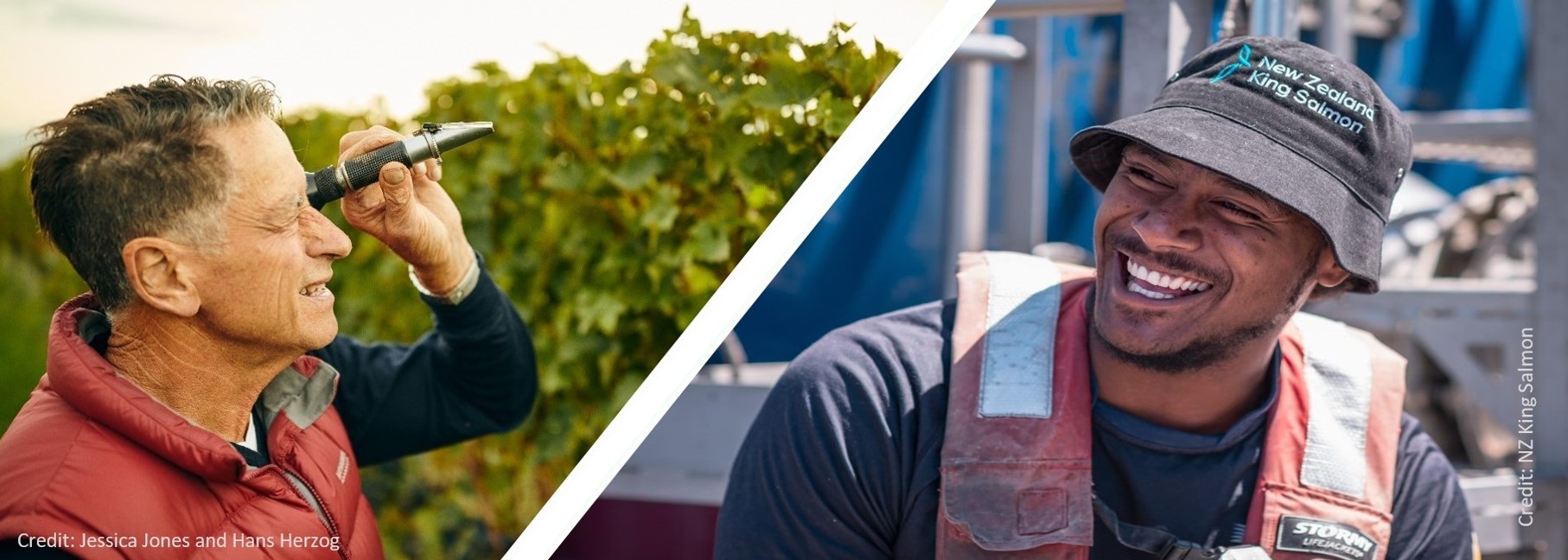Te Mahere Ohumahi ā-Rohe o Te Tauihu o Te Waka-a-Māui | Marlborough Regional Workforce Plan 2023 Summary
A short summary of our 2023 Marlborough Regional Workforce Plan
On this page

Harvest at Hans Herzog vineyard and New Zealand King Salmon worker.
This is the web version of the Marlborough Regional Workforce Plan 2023 Summary.
Download the PDF version:
Marlborough Regional Workforce Plan 2023 Summary [PDF, 370 KB]
Our first annual review and refresh of Te Mahere Ohumahi ā-Rohe o Te Tauihu o Te Waka-a-Māui Marlborough Regional Workforce Plan 2022 has given us the opportunity to look back on our work, celebrate our successes, and make sure we are heading in the right direction.
Over the next year we will continue delivering our workforce plan to address labour and skills challenges in the Marlborough region and to ensure we are well placed to meet the demands of our changing workforce. Our work is guided by the following principles:
- Advocate for Mā Māori, Mō Māori, ki a Māori solutions.
- Influence efforts across our focus sectors to help transition to a more resilient, low emissions
economy. - Communicate analysis and insights on local workforce and skills issues.
- Advocate for local data collection, presentation, and insights.
- Collaborate on education to employment initiatives across the region.
- Connect to Te Tauihu Intergenerational Strategy.
Our focus areas
- Marlborough as an attractive place to live and work
- career and learning pathways
- perceptions of industries and careers
- connections between schools and industry/education providers
- everyone in the region is aware of career and training opportunities
- enabling equitable outcomes for Māori through education and work.
Our focus sectors
Our year 2 priorities (2023-2024)
Our year 2 actions build on the actions we have completed over the last year. We have updated the actions about industry collaboration to take a wider, cross-industry approach across multiple businesses. This change has been driven by what we have learnt in the past year.
Marlborough as an attractive place to live and work
- Action 1.2: Collect data from industry on how many people are required and the necessary skills and attributes.
Career and learning pathways
- Action 2.2: Work across industries to establish a pilot or working group that will trial actions to
identify and communicate the career and learning pathways available in Marlborough.
Perceptions of industries and careers
- Action 3.2: Work across industries to establish a pilot or working group that will trial actions to improve perceptions of their industry and career opportunities.
Connections between schools and industry/education providers
- Action 4.4: Broker introductions between schools and industry to promote opportunities for
collaboration. RSLG members may broker introductions based on contacts, support others
who are best placed to do this such as the Education to Employment broker, and communicate opportunities such as careers events, programmes that link school students with industry (Gateway, Trades Academy), etc. through our communications to stakeholders. - Action 4.5: Lead work with post-secondary education and training providers in Marlborough
to identify solutions to ensure our young people are informed about what they offer.
Enabling equitable outcomes for Māori through education and work
- Action 6.4: Work in partnership with iwi/Māori to support their aspirations and objectives for
solutions to workforce and skills challenges.
Everyone in the region is aware of career and training opportunities
- Action 5.3: Work across industries to establish a pilot or working group that will trial actions to communicate career and training opportunities.
Focus sectors
- Continue to support our focus sectors to develop and implement their workforce plans in collaboration with Workforce Development Councils.

